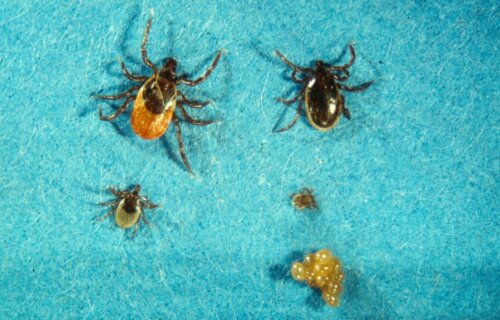COPENHAGEN, Denmark — Want to help scientists learn more about tick-borne diseases and climate change? Just Google about the blood-sucking insect. Researchers from the University of Copenhagen say people Googling about ticks helps advance scientific analysis on their activity patterns.
According to Moestrup Jensen, an associate professor at the University of Copenhagen’s Department of Plant and Environmental Sciences, it’s very difficult to examine tick populations. Because of this, there’s limited knowledge about how tick-borne diseases spread. The United Nations Intergovernmental Panel on Climate Change (IPCC) says there needs to be more monitoring of tick and other vector-borne diseases. It’s needed to measure the effects of climate change and the spread of Lyme disease and tick-borne encephalitis.
“The IPCC says that we desperately need monitoring. But where the heck can we get it from? Usually, you drag a stick with a flag across the ground and count how many ticks settle on the flag. On a good day, we can examine 1000 m2. But there’s no way for us to go out and collect ticks on a scale that resembles monitoring. Google Trends offers a shortcut,” explains Jensen in a university release.
Why are people evening Googling ticks?
People usually turn to Google after they are bitten by ticks. Jensen says these internet searches helps them observe tick populations throughout the world.
“We use the fact that many people who are bitten by ticks search for information about them by opening up their computers and turning to Google. This lets us observe where in the world they are being searched and when,” explains Jensen.
For their study, researchers pulled out time series data recording when during the year Danish people and the populations of nine other European countries search for the word “tick” over a 10-year span. They then matched their findings with weather data. Researchers then examined whether different Google searches of these populations aligned with the ticks’ seasonal patterns in the specific locations and climate variations.
“Looking across Europe, there’s a very clear correlation between people’s tick searches on Google and local temperature variations. It confirms our beliefs about the seasonal patterns of ticks. Among other things, the data also show patterns in which tick-borne encephalitis is found. As such, the distribution of tick seasons might be able to tell us about which diseases are around and can be transported through individual ecosystems,” notes Jensen.
Tracking ticks maps out the changing environment
Jensen adds that keeping track of ticks also monitors the effects of climate change.
“Because ticks feed exclusively on blood, and neither plants nor water that could complicate the picture, and because they are sensitive to fluctuations in temperature and humidity, ticks are a credible climate change marker. If climatic changes occur, you will be able to observe them relatively early in the seasonal rhythms of ticks,” states Jensen.
Jensen says researchers should be using Google Trends data to track the development of certain organisms and their movements.
“Google Trends is a unique database that seems to be able to provide us with knowledge that we are not usually able to acquire. It should be emphasized that one must be careful when using such data, as noise and uncertainties exist Our guess is that the data has a fairly high degree of accuracy if used correctly – not only in relation to ticks, but for all sorts of things,” says Jensen.
“So, here’s a request: If you get bitten by a tick and find yourself uncertain about anything, search online. You’re bound to discover plenty of useful information. Because at the same time, you’ll be helping to advance scientific research,” the professor concludes.
The study is published in the journal Insects.

